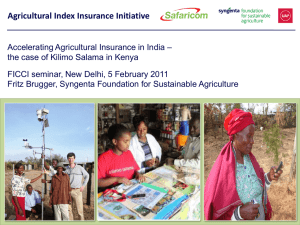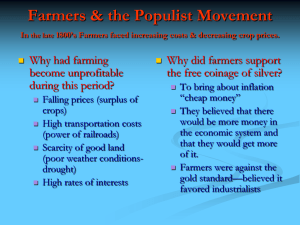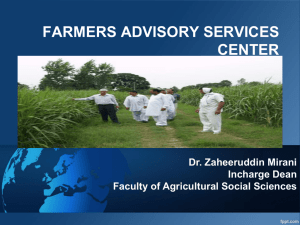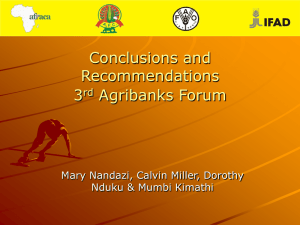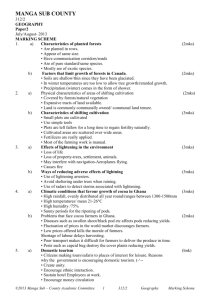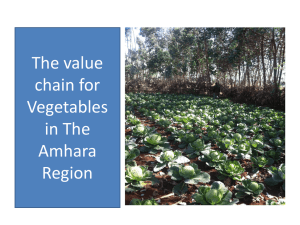TOPIC GUIDE - Evidence on Demand
advertisement
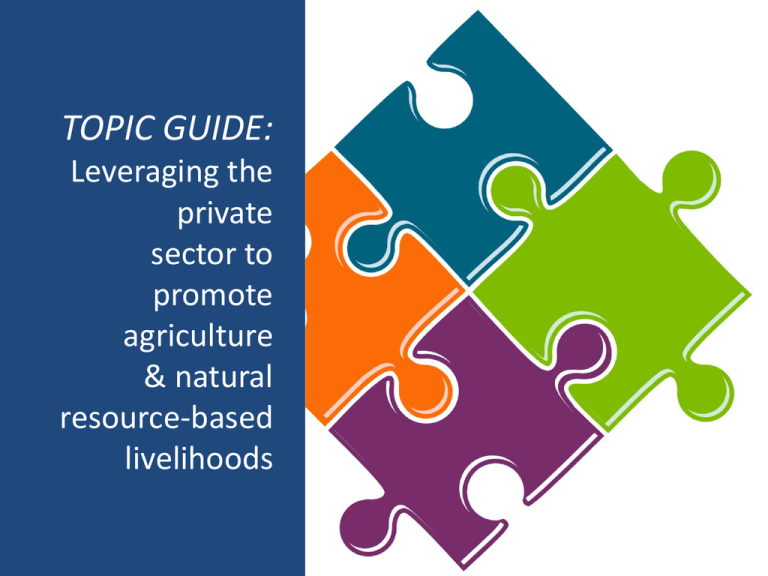
TOPIC GUIDE: Leveraging the private sector to promote agriculture & natural resource-based livelihoods Questions How to stimulatie private investment & initiative to benefit small-scale & informal farmers, fishers and herders Public & private • Different policies for different roles for agricultural households? development? Where do recent DFID initiatives fit? How effective? • TradeMark East Africa, New Alliance for Food Security and Nutrition, Financial Deepening Trust, LIFT Burma, AECF, FRICH, Katalyst, FoodTrade & SAGCOT How to get development impact, avoid pitfalls? Framing Public Role Enabling rural investment climate Peace & security, Macro-economic stability, Rural public goods Roads & other infrastructure Predictable policy & Education, health & clean water Basic economic institutions Agricultural research & extension does not need to be perfect! Rural market failures High info costs, esp. inputs & financial services High initial costs, LR pay-off High costs learning for 1st movers Overcoming market failures #1 Back to state? Former parastatals Back again: fertiliser subs • Most too high cost, unsustainable • Some worked: KTDA, reformed Cocobod • Malawi: exceptional circumstances … & … implementation Overcoming market failures #2 Private & Collective action Contract SF by processors, exporters, retailers • Private firms, sometimes brokered by NGOs specialised in VCs • Eagle Lager, Uganda, sorghum; Blue Skies, Ghana, pineapples; Illovo, Malawi, sugar cane Group farmers in associations or co-ops Use local agents • Farmer initiative, often encouraged by private companies, NGO and government agencies • Many contracting schemes. One Acre Fund farmers groups • Some banks, Microbanking, Bank Rakyat Indonesia • Firms sourcing supplies from SF, Dunavant cotton, Zambia • Fertiliser & agrochemical co’s franchising local farm input dealers, Bayer Green World, Kenya Overcoming market failures #2 Private & Collective action Certification SF produce Global Good Agricultural Practice (GAP) NGO, donor, growers & private firms, especially exporters contracting from smallholders, VegPro, Kenya Fair Trade, Organic Private firms, NGO, foundations, Pineapple growers for Blue Skies, Ghana Overcoming market failures Private & Collective with Public Push Finance Agency banking • Banks, backed up by public regulations, Financial Deepening Trust, Kenya Public loan guarantees • Donor & government, Centenary Bank, Uganda Micro insurance • Donor & government, Financial Deepening Trust, Kenya Index insurance, • Donor, government, foundation, Syngenta’s Kilimo Salama, Kenya often weather-based Overcoming market failures Private & Collective with Public Push Inputs Develop input markets • Train input dealers on fertiliser, inventory credit & g’tees • NGO, donor, government, Katalyst training of input dealers in Rangpur, Bangladesh Direct services to farmers • Input packages • NGO, foundation, One Acre Fund, Kenya & Rwanda Overcoming market failures Private & Collective with Public Push Lever in private investment Patient capital • Quango administers public funds, AgDevCo: e.g. Chiansi irrigation scheme, Zambia Grants from challenge • Quango administers public fund, African funds match private Enterprise Challenge Fund (AECF), Food investments Retail Industry Challenge Fund (FRICH) Introduce investors to • NGO, Foundation, Sustainable Food farmers, local rural Laboratory’s learning journeys businesses SO WHAT WORKS? No precise answers … Evaluation deficit Most things can work, but • Survivor bias • Attribution • Spill-overs • How applicable? Does it reach poor, directly or indirectly? • How great are potential benefits? Wide application Narrow application Higher Direct services to potential farmers benefit Contracting Local agents Patient capital Matching grants Introduce investors to farmers Loan guarantees Lower Micro insurance potential Index insurance benefit Global GAP Fair Trade, Organic Grouping farmers Train input dealers Agency banking Scaling Up? Private initiatives: leave to firms • Narrow application? Public pushes: • Tailor to context, trials • Some will fail • High early costs … subs?! LESSONS Promoting growth by private enterprise Basic conditions critical for agricultural growth Private enterprise has to realise returns Market failures represent a great challenge • — but offer great rewards • … learning processes are the way to overcome them Inclusion and representativeness Don’t expect too much commercial engagement with marginal farmers • Informality the norm • Domestic chains dominate Most SF in Africa probably already live in periurban: not exceptional Commercial SF farming may thus become more inclusive, even if not reaching all Learning lessons and scaling out DFID initiatives address a major challenge Replication & scaling out: working models emerging ALSO IN GUIDE: Better development impact Encouraging inclusion • Labour intensity • Smaller-scale operations • … but not dogmatic Firms do not favour SF/MF Fundamentals matter most for marginalised Correcting women farmer disadvantage Women’s groups Crops long associated with women Crops that help diversify livelihoods Extension for women farmers Target practical needs of women Technology to save time Literacy Avoid pitfalls Loss land & water Exploitation labour Food insecurity Higher risks Environmental damage None inevitable, but careless interventions can harm



